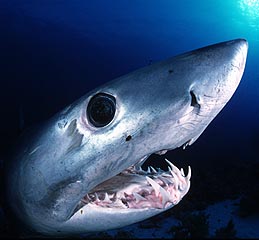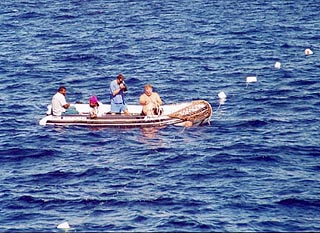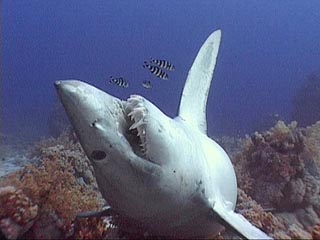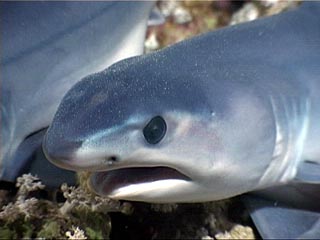Uncharted Waters of the Red Sea
A long sought project to explore
some totally virgin and undived reefs, a gruesome witnessing,
justifying once more the need of awareness campaigns for
shark-protection.
 |
| Photo by Charles
Hood |
Text by
Nicolas A.
Constantinesco - December 2001
A long sought project finally came
alive
To explore, identify and mark (for future cruises) some
totally virgin and undived reefs in unchartered waters in the
most southern part of the Egyptian Red Sea , near the Sudanese
territorial waters (until recently no authorization to sail
there because of neighborhood political differences). This
area is some 200-220 nautical miles south of Hurgada, the main
hub-port for liveaboard ships in the Red Sea. A 2nd smaller
port (Marsa Alam) is still 120 naut. miles north of this
unexplored area.
We sailed for a full 13 days on the Royal Emperor, a
beautiful, almost luxuriously comfortable, and superbly
equipped 100 ft (30 m) steel mono-hull vessel (hot water and
A/C all day, ensuite cabins, Nitrox at will, DragerDolphin
rebreather, etc. etc.) with an excellent and united crew of
10, headed by a very skilled captain.
There were 12
divers (almost all coming from UK), plus 2 guides/instructors
(Grant - from New Zealand - and Sonia - a Swiss-Colombian -,
both absolutely peachy !), plus the owner of the boat (Yasser,
also a very skilled diver, beyond being a lovely and cultured
man who had this idea for a long time and plans to build in
the near future his 2nd even better and faster vessel), and a
long-time good friend of his (Ali, a colourful, charming and
impressive diver who comes from a blue-blood Egyptian family
and who dedicated all his life to diving and protection of Red
Sea marine life, a real larger-than-life character!).
The divers were quasi-all top level. To be noted however,
among others : (Nigel and John) 2 BBC journalists/reporters/
u/w videomen who, in addition, have created a joint u/w video
TV documentary production company, (Charlie) another
journalist/video & photographer for the UK magazine DIVE,
a University of Aberdeen professor of chemistry and marine
biology (an excellent u/w photographer too), a young "of
blue stock" consultant in strategy for top corporations,
an Irishman artist in stained-glass making, and even a
Canadian businessman who flew in specially from Toronto to
participate in this adventure!
Needless to say that the
atmosphere among the 26 people was superb, thanks to their
nice and interesting personalities, and especially to Yasser,
Ali and the 2 guides... and thanks also to an excellent and
diversified cooking at each meal (this does help a lot!).
Egyptian marine charts kept puzzling
us
Sometimes we had to sail the whole night. The Egyptian
marine charts, specially of this area (which is fortunately
off the main commercial route for big freighters) , are quite
weird and kept puzzling us : reefs (and a supposed existing
wreck) indicated in outersea were just not there (our
GPS/sonar only detected depths with more than 100 m and
nothing around it) though we kept looking and looking for
them, turning in circles. Other times we saw and dove on
fairly large reefs (i.e. up to 100 m by 50 m) looming just
under the surface, which were just not indicated on the
charts. Imagine how challenging, not to say iffy (and
sometimes frustrating and time consuming) it was, both for the
captain and crew,... and for us!
Most of the time it was very windy with quite strong seas
(sailing was kind of sporty at times !), with fairly high
waves and strong currents in some exposed sites (many of the
dives and pick-ups were done with/from/by 2 RIB Zodiac types).
In addition, the water appeared rather coldish (21-22º
C.), specially after 3, or sometimes 4 dives a day (several
night dives during the cruise). By then, you end up
building-in some "cold" in your bones ! Only one of
us was wise enough to dive in a dry-suit...but it wasn't me
(too cumbersome to bring it over in the luggage, but next
time/same period, I'll bring mine!).
Fooling around
The first 2 days, going south, and the last 2 days before
disembarking, we dove on known and beautiful reefs. Among
them, was the famous Elphinstone (with its fantastic arch at
55 m deep under the south plateau,...but only some of us went
under it ...!, its fabulous soft corals, its sharks, etc), St.
John's reefs and Fury Shoal (both superb), Rocky Island (just
as beautiful and wild in the middle of nowhere), and on Sataya
reef, known for the hundreds of dolphins that are there almost
all the time. On the latter, we obviously dove without the
tanks so as not to alienate the dolphins with our bubbles,
specially that there were also many recently born puppies.
After an hour of fooling around, apnoea diving with them and
taking pictures and videos, we were all freezing to death but
nobody wanted to leave the water... You never get tired of
watching them and swimming with them, even after multiple
similar experiences... They are so cute and funny! This, as
usual, was one of the highlights of the cruise.
| Rebreather Diving |
|
"Now that I am licensed in Rebreather
diving, I highly recommend it for all those that are
u/w video or photographers: you can get as close as a
few cm. from a fish without scaring him as your
breathing is soundless, you issue no bubbles, and you
keep your depth level regardless of your breathing
rhythm. Plus the fact that you breathe Nitrox (more
comfortable and healthier), the mixture you inhale is
warmer and moist, and you can substantially extend
your bottom time before entering into decompression..." |
|
Several of the new sites were OK but nothing exceptional in
terms of corals or u/w landscape, save the thrill of exploring
undived sites and yo-yoing to see/note if anything worthwhile
was at any of the depths (discussing our findings and
comparing notes later in the main living room). A few sharks
(not as many as we hoped for) but quite shy, (mainly Gray Reef
and Longimanus, but no Hammerheads, Tiger, Mako or Silkies -
maybe they were still too deep at this season), and the usual:
morays, turtles (not many), huge well-fed grupers, thuna, 2
manta rays one day, etc. etc. Clearly much more fauna than in
most dived sites. A couple of sites though, were exceptional
and warranted, not only this cruise, but a few more new and
more systematic exploration-cruises so as to get a more
comprehensive picture of this huge area. Plans are to repeat
the exercise (with some of the same gang) some time next year!
On one occasion, on a night dive of over an hour long, along
a steep drop-off wall, we saw, among other fascinating things,
two Spanish Dancers who danced for us under the lights of our
torches. A marvellous vision that was video-ed by my buddy
Grant. That evening, coming back on board from that memorable
long dive with the Dräger Rebreather, we got a surprise!
We were welcomed by the whole crew who sang, played their
local musical instruments and clapped their hands for us two
(the only 2 crazy ones who dared diving that night)...I was
freezing cold (Grant, wisely, dove with his dry-suit) and we
both got two warm mugs of hot chocolate... The best drink I
had in years.
On another occasion, being the birthday of one of the
divers, the cook had cooked a surprise chocolate cake for
after dinner and the crew again gathered to give, us and the
owner, a recital of Arabian southern songs with all sorts of
drums, pots and cans, the captain playing an ancient-type
Egyptian harp-guitar, with everybody, including the crew,
ending up dancing Arabian dances on the upper deck under the
moon and the stars...Very, very nice indeed!!!
Gruesome and pathetic shark vision
But the real highlight of the trip, and totally unexpected
too, was something quite unique which left all of us very
saddened and crossed.
One early morning, after a night sailing, we were reaching a
new reef (10-15 nautical miles from the coast) when we saw, on
its side, a string of buoys tied together. At first, we
thought from the distance that they were mooring buoys and
wondered who the H... had been there before, as it was
definitely not a diving site.
Getting closer, we realized
that it was a totally illegal fishing system, even in Egypt,
set up at dusk and picked up at dawn by small local fishermen.
This way, they were safer in their endeavours, even though the
Egyptian coastguards, by not having enough means and equipment
to control and enforce the law, are mostly absent from such a
big area and such unchartered waters...
The 10 buoys were
tied together about 10-15 m. apart, and from each one hanged a
thick long rope with a big baited hook (essentially for sharks
and big thuna). We were told that a catch of a 2-3 m. shark of
300-400 kg could fetch as much as 5 to 10.000 USD for the
fishermen (and their "sponsors")...
 |
| Photo by
Marie-Claude Bittar |
|
|
We were very upset and decided to get a closer look by RIB,
take pictures and video as proof, dismantle the trap and bring
it onboard as evidence for a report to the authorities. While
doing so, the fishermen's small boat appeared in the horizon
and when it got closer, one of our crew members (who
recognised its occupants) shouted to the 5 fishermen what we
were going to do and that we'll take pictures of their boat to
make a report. They immediately hid their faces and sailed
away at full steam, running and leaving behind their fishing
tool.
While cutting the boeys and trying to lift the ropes to the
RIB, we noticed them as unusually heavy, indicating that there
might be some catches on the hooks. To our dismay, dragging
the rope, appeared a good-sized Mako shark of about 2,50 m.
still alive but barely moving (must have been hanging on the
hook for some time...). By dragging the animal just under the
surface with the RIB, we hoped that it would revitalise it and
enable it to survive after we cut the rope, but it was of no
avail. The shark was dying...We got it next to the back
platform of our vessel, took many shots for evidence, noticing
it was a female (and rather wide-bodyed too) and, sadly and
reluctantly, we cut the rope... She just sank to the bottom,
at about 20 m and died.
The Mako is among the fastest,
most vigorous, and reputedly dangerous sharks (with the Bull
Shark, the Tiger Shark, the Lemon Shark and the Great White
Shark). It can even leap out of the water. Its teeth are
ragged and look impressive.
After much discussion we came to the conclusion that her
size and shape might indicate that she could be pregnant and,
if that was the case, it was worthwhile trying to save the
baby-sharks litter. A lot of action and preparations ensued.
John doned his integral u/w mask with an incorporated
microphone, Nigel and the rest of us (4) equipped ourselves
with everything, from cameras, videos, knives, etc. (I wore
the Drager Rebreather System), and go, gO, GO...!!!
 |
| Photo by Bigfish
Television |
Indeed the animal was dead and lying on its side on some
corals. Gruesome and pathetic vision... Nigel took a good
footing of John who made an introductory description, next to
the shark, before "practicing autopsy/surgery".
The animal was pushed more on its back and John started the
incision. During the whole exercise, which he practiced with
skill and the greatest of cares (since then we nicknamed him "the
Autopsy Man"), and lasted 20 minutes, 10 baby-sharks of
about 50/60 cm. were extracted, one after the other... and
they were still alive but, unfortunately, being premature,
they still had their nutritional pouch too inflated to enable
them to swim.
Later, we estimated that they were just
short of about 2 weeks to be born. Had the mother not taken
the bait, 11 more sharks (except those predated by others)
would still be alive today for the benefit of the ecosystem
and of scuba divers.
 |
| Photo by Bigfish
Television |
|
|
Though still alive, taken out from the mother's matrix,
they just could not swim. I tried with a couple of them to "ventilate"
them by holding them behind their gills and swimming around,
but it was hopeless...They just died. Very sad indeed.
They were soft, silky, eggshell white in colour, with eyes
like small black shiny buttons... They looked like small
rubber toys...
Sadly, we lined them up on a coral, next
to their mother and took several more shots for posterity: for
the report, for a documentary, and for articles in diving
magazines to add to an awareness campaign of shark-protection.
When we dove again on the same site a couple of hours later
to assess the situation, thinking that the remains will have
brought a feast for all the sharks and fish in the region, we
were astonished to find out that the remains were intact.
Except for two baby-shark that had disappeared... probably
snatched by a big moray or another shark. We concluded that a
"dead" and motionless fish is not as appetising
(except for scavengers) than injured but still living/swimming
fish or crushed fish meat (a delicacy for shark feeding
exercises).
What is interesting is that our vessel's crew, though all,
either ex-fishermen or related to fishermen for who a shark is
"bread guaranteed" for their families, were all on
our side and adamantly opposed to catching/killing sharks :
With time and frequent contact with divers, they finally
understood, and are now spreading the word, that their
livelihood depended on the survival of sharks, these superb
creatures which are much sought after to be seen and filmed by
scuba divers...
In short, sharks attract scubadiving
tourism which in turn, helps to improve living standards for
locals... Simple...! Nicolas
or Nicky/The Sea Fox (as some call
me)/The Admiral (as others also call me)/or Neptunis... |